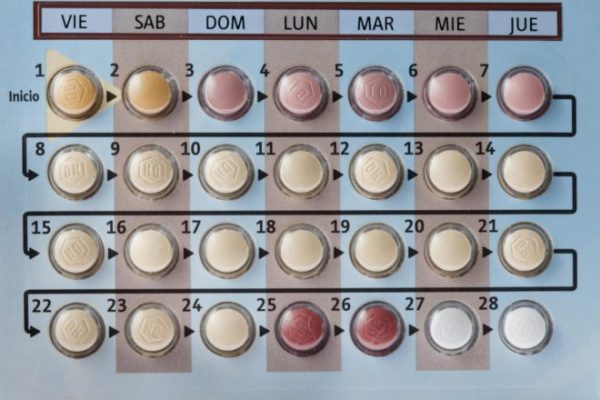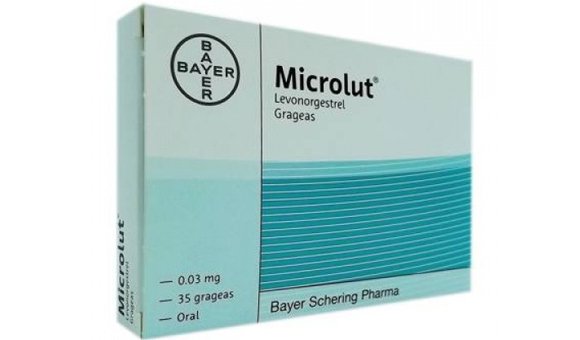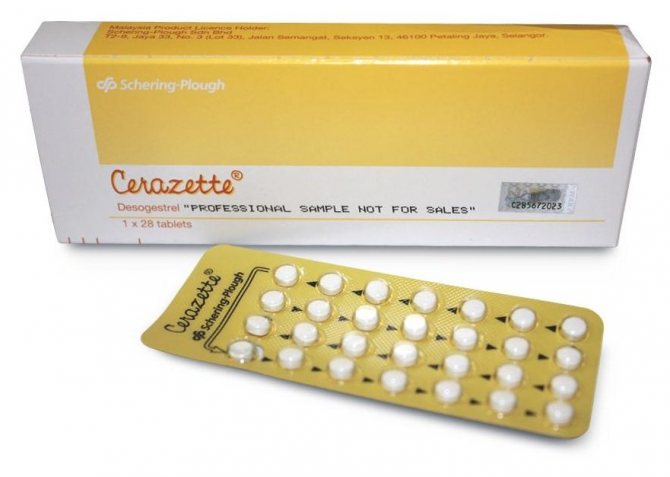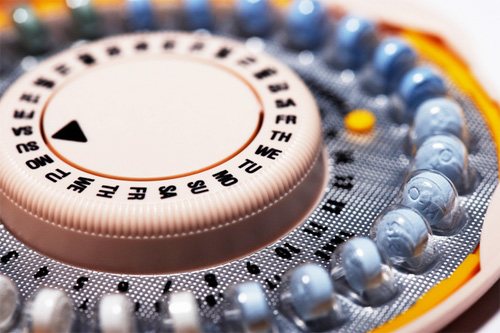Contraceptive methods for breastfeeding: comparison of effectiveness
Birth control pills
There are two types of birth control pills:
- gestagenic, so-called. mini-pills (efficacy is 99% when taken correctly, otherwise – 92%) [2];
- combination drugs, or COCs.
Mini-pills are single-component products containing gestagen or progestogen. Efficacy is based on the ability of progestogens to act on the mucus that closes the entrance to the cervix. The mucus becomes thicker, creating a barrier for sperm. You can take it immediately after childbirth (in the absence of contraindications).
A small amount of hormones is transferred to the baby through breast milk, and this does not cause him harm. Such contraceptive pills are safe during breastfeeding because they do not affect the functioning of the mammary glands. Side effects are rare.
COCs contain two types of hormones: synthetic estrogen and progestogen. These drugs are one-, two- and three-phase, depending on the percentage of hormones in the composition.
Combined contraceptives are prohibited during lactation.
Other methods of contraception: list
At any time after childbirth, if a woman has no contraindications, she can use:
- contraceptive implant (more than 99% effective) [3];
- contraceptive injection (more than 99% effective) [4];
- male condoms (98% effective when used correctly) [5];
- female condoms (95% when used correctly) [6]: IUD (intrauterine device) (more than 99% effective) [7]; IUD (intrauterine system) (more than 99% effective) [8].
The IUD can be inserted within 48 hours after birth. If the device/IUD has not been inserted within 48 hours, it is recommended to wait until four weeks after birth to start using it. [10]
Other methods of protection
In addition to pills, there are some other forms of contraception for lactating women:
- Lactational amenorrhea method (natural contraception due to the release of a hormone by the woman’s body that regulates lactation). It has an effect in the first six months after the baby is born and only if the necessary conditions are met (regular breastfeeding and no complementary feeding);
- Barrier method. The use of condoms protects not only from unplanned pregnancy, but also from some sexually transmitted diseases. Can be used from the first days after the baby is born;
- Spermicides. Available in the form of suppositories, tablets, ointments. Can be used from the beginning of restoration of sexual activity after childbirth. Contraceptive suppositories during breastfeeding do not change the consistency and taste of milk;
- Intrauterine device. Can be used six months after birth if there were no complications. Does not affect mother's milk;
- Injections. Used 6 weeks after birth at intervals of 3 months. They do not affect lactation.
If mommy decides to protect herself with pills, then mini-pills are ideal for this purpose. You should visit a doctor to determine which ones are best for mommy. If chosen correctly, the tablets will not have a harmful effect on milk and the baby. On top of that, OCs will help restore hormonal levels, which will have a positive effect on the external and internal state of a woman.
Approved tablets

A breastfeeding mother thinks she won't get pregnant while breastfeeding, but that's only half true. Only in the first six months is the risk of pregnancy reduced to a minimum.
Lactation amenorrhea is a period of natural contraception. Breastfeeding your baby inhibits ovulation and is 98-99.5% effective in preventing pregnancy. [1]
However, even at this time, there is still a small risk of becoming pregnant. Each woman is individual; the menstrual cycle can begin in the second month of breastfeeding.
Oral medications are 99% effective. Previously, nursing mothers were not allowed to use this method of contraception, but with the development of medicine, medications appeared that were approved for use by women with breastfeeding. Birth control pills during lactation are prescribed by a specialist, taking into account the physiological characteristics of the body. After all, many women don’t even have an idea about what kind of birth control pills they can use while breastfeeding.
Mini-pill
Mini-pills are recommended for use during breastfeeding.
Mini-pills are suitable postpartum birth control pills while breastfeeding.
They are gestagen-containing contraceptives. They do not affect lactation activity or the duration of feeding. Side effects are absent or minimized. Their use reduces the risk of thrombosis. Libido does not decrease.
If you stop taking the pills, the ability to conceive returns as soon as possible. Side effects such as headaches and nausea may occur at the beginning of treatment. After some time they disappear.
Even taking into account the fact that such contraception is allowed for breastfeeding, it is recommended to consult a specialist before using it.
The doctor will choose the appropriate contraceptive and the appropriate dose. It should be noted that there are drugs that are prohibited to be used after an artificial birth (caesarean section), when treated with antibiotics.
Lactinette ®
Dispensed by prescription. The active substance is Desogestrel.
These contraceptive pills are widely used during breastfeeding. Lactinet is effective and contains small doses of gestagen. Its effect is aimed at inhibiting ovulation. Studies have been conducted that show no difference between the mental and physical development of children whose mothers took Lactinet and the development of other children.
Charozette (Cerazette ®)
Dispensed by prescription. The active substance is Desogestrel.
Contraceptive pills Charozetta are similar in composition to Lactinet. Charozetta is contraindicated for liver problems, uterine bleeding, tumors, blood clots in the deep veins, kidney dysfunction, and individual intolerance. The effect of the drug is similar to most COCs.
If you choose: Lactinet or Charozetta, you should take into account that the composition and effect of the drugs are identical, but the price of Charozetta is twice as much.
Exluton
Dispensed by prescription. The active substance is Linestrenol.
Exluton suppresses ovulation. Synthetic gestagen increases the amount and viscosity of cervical mucus and reduces the penetrating ability of sperm. Reduces the transport capacity of the fallopian tubes.
Microlut ®
The main component of the contraceptive is Levonorgestrel. The amount of active ingredient is minimal, so the tablets are well tolerated.
Suppresses ovulation. Reduces menstrual bleeding, eliminates menstrual pain. Microlut is not prescribed for liver diseases or bleeding from the uterus.
comparison table
Table 1 - Comparison of approved contraceptive pills for breastfeeding
| Name: | Active substance: | Mode of application: | Price: |
| Lactinet | Desogestrel | 1 tablet per day, 28 days | 650 rub. |
| Charosetta | Desogestrel | 1 tablet per day, 28 days | 1300 rub. |
| Exluton | Linestrenol | 1 tablet per day, 28 days | 2100 rub. |
| Microlute | Levonorgestrel | 1 tablet per day | Not for sale |
If side effects occur, stop taking the tablets. You need to consult a doctor who will select a different type of means or method of protection.
Oral contraceptives for breastfeeding, review of drugs
If you are pregnant, it is better to take low-dose birth control pills. These include: Charozetta, Marvelon, Regulon, Janine, Silest, Ovret, Micronor, Exoluton, Microlut, Laktinet, Modell mam.
The most popular are Charozetta, Lactinet and Microlute. They have a minimum of side effects and good protection against unwanted pregnancy.
The drug Lactinet

Contains the active substance desogestrel. This substance greatly inhibits ovulation and protects against pregnancy. Efficacy is reduced if the interval between tablets is 36 hours or more. Does not affect milk production. The effectiveness can be compared with combination pills containing several hormones.
If there is no menstrual flow, Lactinet should be taken 6 weeks after birth. While taking these tablets, the taste of milk does not change, you can safely feed your baby.
There are 28 tablets in one pack, so a 7-day break is not needed.
Feedback from women about these pills is mostly positive, among them there are some positive aspects that are more common:
- Skin regeneration;
- Weight does not increase;
- There are no allocations;
- Optimal balance between price and quality.
Microlut drug

The active substance levonorgestrel increases the viscosity of the cervical mucosa, preventing sperm from entering the uterus. And in addition, it prevents the fertilized egg from catching inside the uterus.
Microlute is used not only to protect against unplanned pregnancy, but also for hormonal therapy.
One package contains 35 tablets. Take 1 tablet per day without interruption.
If 6 weeks have passed since your menstruation and the next one has not arrived, you should be tested for pregnancy, and if it is absent, continue taking the pills.
After discontinuation of Microlut, the body quickly regains the ability to conceive.
In the first few months of use, there may be intermenstrual bleeding, in which case you need to visit a doctor, but the drug should not be discontinued.
If you miss a pill, you must continue taking it, but please note that complete contraception will occur only on the 14th day of daily use. During this period, it is worth protecting yourself with additional methods.
On a note! This drug has one caveat: it is less effective for overweight women. It is also worth remembering that these tablets are effective only during the first year of a child’s life, then the effect decreases. After a year, you should change the drug to a stronger one.
The drug Charozetta and its effect on infants

The main substance desogestrel suppresses ovulation and thickens mucus in the cervical canal, preventing pregnancy. Release form: 28 tablets, take without interruption.
It is allowed to use Charozetta birth control pills during breastfeeding, since they do not affect milk and do not change its taste and consistency. The minimum dose that enters the child’s body does not harm the baby.
With prolonged use, the likelihood of nausea, vomiting, and light uterine bleeding increases. In this case, you should consult a doctor.
Attention! When using oral contraceptives, you must visit a gynecologist every 6 months in order to eliminate negative effects on the body.
If a mother takes OK in the first six months after the birth of her baby, then she is 99% protected from unplanned pregnancy. Because in this case, the period of lactational amenorrhea still works to help the pills.
Prohibited pills
When breastfeeding, it is prohibited to take combination medications, no matter whether they are single-, two-, or three-phase. They significantly increase the amount of estrogen in a woman’s body. This negatively affects the physical development of the baby. COCs have many side effects.
The components of these drugs are excreted in breast milk, and the amount may decrease.
List of prohibited contraceptive pills: Jess, Logest, Lindinet, Silest, Zoeli, Qlaira, Dimia, Miniziston, Novinet, Mercilon, Janine, Femoden, Demoulen, Chloe, Tri-Mercy, Microgynon, Silhouette, Marvelon, Miniziston, Rigevidon, Belara, Lindinet , Regulon, Triquilar, Non-Ovlon, Tri-Regol, Ovidon, Trizeston.
When is conception possible after childbirth?
Doctors recommend that after childbirth, at least a couple of years pass before the next conception. Such a break is necessary for the full and final restoration of the female body and its preparation for the next pregnancy. Therefore, the question of choosing contraceptive pills during breastfeeding is considered almost inevitable.
Conception after childbirth occurs only when the mother resumes ovulation and menstrual cycles. It takes a different amount of time for each woman to restore fertility and reproductive functions. This indicator is determined by the hormonal status and depends on the degree of complexity of the birth. Lactation and breastfeeding are of no small importance for the speed of recovery.
For approximately 8 weeks after birth, vaginal discharge cannot be considered as menstruation. But doctors recommend starting birth control three weeks after birth to minimize the risk of conception. If the mother does not feed the newborn, then full ovulation occurs within 6 weeks.
Rules for taking birth control pills during lactation
When taking birth control pills, a nursing woman must strictly follow the instructions and recommendations of the doctor.
- Preparations containing progestogen are started on the 21st day after birth.
- Do not increase or decrease the dosage prescribed by your doctor. Excessiveness will lead to unwanted side effects, and a small dose will not give results.
- Observe the timing of taking the drug: the 3-hour tablet (a traditional progestogen-only tablet) should be taken no later than 3 hours (after sexual intercourse) at the same time every day; The 12-hour tablet (progestogen-only desogestrel) should be taken no later than 12 hours at the same time every day [2].
- When conception is diagnosed, use is stopped (since the drugs have an abortifacient effect).
- Do not use during antibiotic treatment.
The effect of contraceptives on infants
Birth control pills that can be taken during breastfeeding should not contain estrogen. These hormones have a negative effect not only on the lactation process, but also on the baby, inhibiting its development.
A small amount of synthetic gestagen from contraceptives passes into breast milk. However, there is no evidence that it is dangerous for the child. Some babies under six weeks of age may have problems metabolizing hormones. For this reason, it is not recommended to start using hormonal contraceptives until your child is older. [9]
Oral contraceptives - what you need to know?
Contraceptives for breastfeeding should be taken in accordance with the requirements and recommendations. To do this, you need to understand their action, rules of administration, impact on infants and adverse reactions.
Operating principle OK
The mini-pill contains a synthetic hormone identical to that produced in the body of pregnant women. Thanks to this, pregnancy is almost completely excluded when taking the pills.
The principle of action of the tablets is that they act on the mucous membrane of the cervix, increasing secretion and preventing the invasion of sperm into the uterus. As a result, the sperm cannot fertilize the egg, and it has no chance of being fixed in the uterus. In addition, ovulation is suppressed.
On a note! The effectiveness of OK reaches 98%.
Types of drugs
For contraception during lactation, you should choose pills with a low dosage of hormones. Such drugs will not harm the baby and will protect against pregnancy.
There are many names of contraceptive drugs for women who breastfeed, among them are Charozetta, Microlut and Lactinet. These drugs contain a minimum of hormones and do not have a negative effect on the body.

You should choose pills that are low in hormones
The advantages of this method of contraception
According to experts, in the postpartum period and during lactation, birth control pills are the best method of birth control. Because they are considered the most effective for protection against unplanned pregnancy. In addition, they have a number of other positive qualities for a woman’s body.
Among the advantages are:
- Low risk of side effects;
- They do not affect milk and the duration of feeding;
- Treats pelvic diseases;
- Easing menstrual pain;
- Reducing the risk of blood clots;
- Do not affect the psyche and libido;
- Rapid resumption of conception after discontinuation of the drug.
How to take OK?
Attention! When using oral contraceptives, you must strictly follow the instructions and prescriptions of your doctor.

Tablets should be taken daily, at the same time
You should take one tablet a day at a strictly defined time. If the tablet was taken at 9 am, then the next day you should also take it at 9 am. A slight deviation of a few minutes is possible; with a large deviation, contraception is reduced.
If you do not comply with the OK regimen, conception is possible as a result. It is forbidden to stop taking pills in the middle of the cycle; you must take all the pills in the package and wait for your critical days.
In the first couple of weeks of use, it is better to use additional contraception. During this time, the body will get used to the pills, and the protective barrier will return to normal.
If pregnancy occurs, you should stop taking birth control pills and visit your doctor.
The effect of contraceptives on the baby
Is it possible to drink OK during lactation? Mini-pills contain one gestagen hormone and in a minimal amount, so the use of such OCs is allowed when feeding a child without harming him.
The use of mini-pill contraceptive pills does not affect the growth and development of the baby, since they do not contain estrogens, which affect breast milk. The dose of the hormone passed through the baby's milk is minimal and does not harm the small organism.
Adverse reactions
Oral contraceptives, like any medicine, have side effects during breastfeeding, these are:
- Cycle disruption;
- Allergic reactions;
- Headache;
- The appearance of acne;
- Nausea;
- Breast tenderness;
- Weight gain.
Important! If adverse reactions occur, you should immediately stop taking the drug and consult a doctor.

Like any other medication, birth control pills can have side effects.
When not to take oral contraceptives
Before using OCs, you must be examined by a doctor for contraindications to use. These include:
- Oncological diseases;
- Cirrhosis of the liver;
- Hepatitis;
- Kidney tumor;
- Vascular damage;
- Epilepsy;
- Uterine bleeding;
- Diabetes;
- Ischemic disease;
- Previous stroke, heart attack;
- Hypertension;
- Rheumatoid arthritis.
How to stop taking contraceptive pills
Stopping taking OK occurs in two cases:
- Complete refusal of pills;
- Change of drug.
To ensure that the cancellation period passes with minimal consequences, you should follow some rules:
- You cannot stop drinking without completing the cycle;
- Before canceling, you should consult a gynecologist;
- You should stop taking it in accordance with the plan drawn up by your doctor.
When replacing the drug, you should also consult a gynecologist. It is advisable to contact the same doctor who prescribed the previous pills.
In any case, it is impossible to abruptly interrupt the started course; the drug should be used to the end. After finishing, you need to take a week's break and wait for your period.
Abrupt withdrawal of the drug is fraught with:
- Violation of the cycle;
- Uterine bleeding;
- The occurrence of pregnancy.
Alternative methods of contraception
There are individual reasons when a woman breastfeeding a child should not take birth control pills. In this case, you need to choose alternative contraceptives when breastfeeding.
Barrier methods
Barrier methods - the use of condoms, diaphragms and caps. This contraception does not affect the functioning of the mammary glands, which is very important for nursing mothers. There is no effect on the baby. Before use, it is necessary to determine the size of barrier feminine products, since after the birth of the baby the size of the vagina has changed. To improve the effect, the use of spermicides is allowed.
Expert opinion
Sokolova L. S.
Pediatrician of the highest category
Contraceptive pills for breastfeeding may be inferior in effectiveness to barrier methods of contraception.
Birth control suppositories
The active substances of the suppositories are not absorbed into the blood, do not penetrate into the milk and do not affect the child. Some disadvantages lie in the chemical composition of the contraceptive: contraceptive suppositories for breastfeeding, when used for a long time, disrupt the vaginal microflora. Also, sexual intercourse itself depends on the duration of action of the drug - you have to wait until it takes effect. And after intimacy, you need to wait a certain period for hygiene.
Despite the inconvenience, contraceptive suppositories during breastfeeding have an advantage over oral contraceptives: they are not used regularly, but only when needed.
Intrauterine device
Experts are inclined to use the IUD because it has a high degree of effectiveness. What is better to use when breastfeeding - contraceptives or an IUD - is up to the mother to decide after consultation with a gynecologist. There are hormonal IUDs, they are also used to treat endometriosis. The spiral is installed for several years. It does not have any effect on the baby or lactation.
In the absence of contraindications, if the birth proceeded normally, this method may be used in the postpartum period. The spiral can be installed within 48 hours after birth, or after 4 weeks [10]. This method is not used after artificial birth (caesarean section).
Intrauterine devices do not protect against infections.
Calendar method
When using the calendar method, the estimated date of ovulation is calculated and abstaining from sexual intercourse on “dangerous” days. This method is ineffective. Out of 100 women, 9-40 will become pregnant.
Birth control pills are more effective during breastfeeding.
Opinion of Russian gynecologists
Doctors in Russia are extremely reluctant to prescribe COCs to their patients during lactation, citing the fact that the issue has not been studied and the consequences can be dire. In most cases, gynecologists advise taking mini-pills until breastfeeding ends or suggest placing an intrauterine device for a period of 5 years.
Doctors who allow the use of COCs during lactation prescribe them no earlier than 9-12 months after birth. Gynecologists recommend focusing on the child’s development and food interest. If the baby eats well and does not refuse food offered, a decrease in milk volume will not affect his health. In this case, you can start taking COCs from the first day of your next menstruation. If a child does not eat solid foods well even at about a year old, there is no need to rush. Switching to COCs will deprive him of his main source of nutrients - breast milk - and will negatively affect his health.
In practice, taking COCs is justified for nursing mothers who plan to complete breastfeeding in the near future, but are going to do it gently and smoothly - over a few months. During this period, you can gradually expand the child’s diet and at the same time switch to combined oral contraceptives.
Types of contraception during breastfeeding
After giving birth, you need to choose a reliable method of contraception in order to plan a new pregnancy no earlier than in 1.5-2 years. During this period, the body will have time to recover. After a cesarean section, it is necessary to take a pause of 2 years or more for a full-fledged scar to form on the uterus.
Contraception must be reliable during breastfeeding. During breastfeeding, ovulation may be suppressed for a long time, but in some women, ovarian function is restored after 3 months, which leads to accidental conception. Therefore, a month after giving birth, you need to visit your gynecologist and choose the most suitable method of contraception during lactation.
Prevention during breastfeeding is possible using the following methods:
- oral contraceptives with a gestagenic component;
- intrauterine device;
- barrier contraceptives;
- contraception with spermicidal agents;
- local hormonal preparations for contraception.











